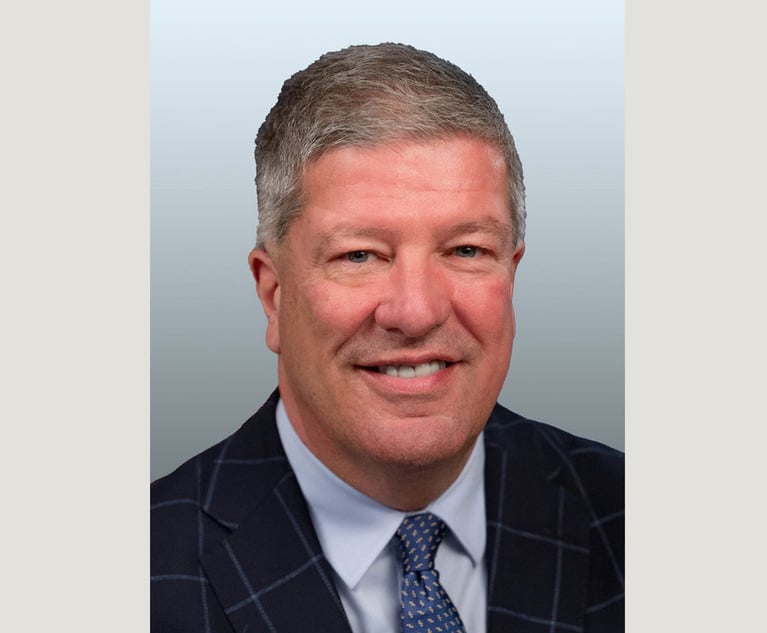Phila. Jury Hits Doc With $2.2M Verdict Over Excessive Opioid Prescriptions
The lawsuit raised medical malpractice claims against Dr. Jeffrey Bado, who was convicted on numerous counts in 2016, including drug distribution resulting in death and maintaining a drug-involved premises.
May 06, 2019 at 04:54 PM
4 minute read
 Photo: Shutterstock
Photo: Shutterstock
A Philadelphia jury has awarded more than $2 million to a woman who claimed that her former pain management doctor needlessly prescribed her addictive opioid medications, which led to both mental and physical injuries.
The jury in Rivera v. Roxborough Memorial Hospital returned its verdict May 3, after nearly three weeks of trial and three hours of deliberation. The verdict included $22,000 for past medical expenses, $700,000 in pain and suffering and $1.544 million in future medical and related expenses.
The lawsuit raised medical malpractice claims against Dr. Jeffrey Bado, who was convicted on numerous counts in 2016, including drug distribution resulting in death and maintaining a drug-involved premises.
According to Zajac & Arias attorney Eric Zajac, who, along with Evan Padilla, tried the case on behalf of plaintiff Yvonne Rivera, Bado was essentially “doubling down” on opioid prescriptions at a time when the public was just beginning to recognize what has become the national opioid crisis.
“Today, a lot of the focus is on the pharmaceutical companies themselves and their responsibility, but it certainly is fair to discuss what role pain management physicians have played in the development of today's epidemic,” he said.
Zajac said a key witness in the case was a former employee of Bado's, who, Zajac said, testified that the practice was seeing an average of 70 patients a day and that prescriptions were often times pre-filled.
Bado's attorney, Richard Maurer of Flamm Walton Heimbach, however, said it was a very challenging case to defend because Bado was not able to attend any of the proceedings because he was incarcerated. Maurer further noted that he had to tell jurors that Bado had been incarcerated for health care fraud and making false statements to federal agents.
“It was an uphill battle,” Maurer said.
According to the plaintiff's pretrial memo, Rivera began treating with Bado in 2010 in connection with recurring foot pain. During some of the treatments, she became nauseous and vomited, but he continued treating her with “excessively high” doses of opioids, and eventually started giving her the medication through an intravenous infusion port, the memo said.
The memo said the first infusion port broke and had to be removed and replaced, at which point she developed septicemia. A third port was installed, but again, Rivera developed septicemia. The fourth and final infusion port was installed in January 2013, the memo said, noting that the ports were installed each time at the Roxborough Memorial Hospital.
Rivera's memo said Bado attributed Rivera's nausea and vomiting to metastatic endometriosis, but the memo said there was no evidence she suffered from that condition, Bado did no diagnostic testing and Bado was not an oncologist, who could make that diagnosis. However, the memo said, Bado continued increasing Rivera's dosage of the powerful painkiller Fentanyl.
The memo also said Bado's records were largely unreadable, and that prescribing intravenous drugs for a woman who was younger than 40 was against the standard of care.
In terms of damages, the memo said Rivera suffered unnecessary surgeries and addiction, which caused psychiatric and emotional injuries, including memory loss, nightmares, anxiety, depression, flashbacks and post-traumatic stress disorder.
Bado's pretrial memo, however, contended Rivera was exaggerating her injuries, that Rivera showed no signs of addiction during her treatment, that Bado did not install any of the intravenous ports, and that the surgeon who installed those ports obtained informed consent.
The memo also noted that Rivera's medical files were not part of Bado's federal indictment, arguing this showed she had not been over-prescribed. The defendant further contended that Rivera's case was an attempt to leverage Bado's conviction and the opioid crisis.
“Ms. Rivera's last contact with Dr. Bado occurred during an office visit on Dec. 19, 2012, and yet Ms. Rivera attributes nightmares, post-traumatic stress disorder and even a split personality syndrome to medical treatment by Dr. Bado that came to an end almost six years ago,” Bado said in the memo. ”Ms. Rivera attempts to build a case on circumstances—a criminal conviction and the 'opioid crisis'—that do not apply to her treatment by Dr. Bado,”
The claims against Roxborough Memorial resolved prior to trial, and the verdict against Bado was subject to a confidential high-low agreement, according to Maurer.
Philadelphia Judge Linda Carpenter presided over the case.
Litchfield Cavo Andrew Kessler, who represented the hospital, declined to comment for the story.
This content has been archived. It is available through our partners, LexisNexis® and Bloomberg Law.
To view this content, please continue to their sites.
Not a Lexis Subscriber?
Subscribe Now
Not a Bloomberg Law Subscriber?
Subscribe Now
NOT FOR REPRINT
© 2025 ALM Global, LLC, All Rights Reserved. Request academic re-use from www.copyright.com. All other uses, submit a request to [email protected]. For more information visit Asset & Logo Licensing.
You Might Like
View All


Stevens & Lee Hires Ex-Middle District of Pennsylvania U.S. Attorney as White-Collar Co-Chair
3 minute read
Judge Tanks Prevailing Pittsburgh Attorneys' $2.45M Fee Request to $250K
5 minute readTrending Stories
- 1Decision of the Day: Court Holds Accident with Post Driver Was 'Bizarre Occurrence,' Dismisses Action Brought Under Labor Law §240
- 2Judge Recommends Disbarment for Attorney Who Plotted to Hack Judge's Email, Phone
- 3Two Wilkinson Stekloff Associates Among Victims of DC Plane Crash
- 4Two More Victims Alleged in New Sean Combs Sex Trafficking Indictment
- 5Jackson Lewis Leaders Discuss Firm's Innovation Efforts, From Prompt-a-Thons to Gen AI Pilots
Who Got The Work
J. Brugh Lower of Gibbons has entered an appearance for industrial equipment supplier Devco Corporation in a pending trademark infringement lawsuit. The suit, accusing the defendant of selling knock-off Graco products, was filed Dec. 18 in New Jersey District Court by Rivkin Radler on behalf of Graco Inc. and Graco Minnesota. The case, assigned to U.S. District Judge Zahid N. Quraishi, is 3:24-cv-11294, Graco Inc. et al v. Devco Corporation.
Who Got The Work
Rebecca Maller-Stein and Kent A. Yalowitz of Arnold & Porter Kaye Scholer have entered their appearances for Hanaco Venture Capital and its executives, Lior Prosor and David Frankel, in a pending securities lawsuit. The action, filed on Dec. 24 in New York Southern District Court by Zell, Aron & Co. on behalf of Goldeneye Advisors, accuses the defendants of negligently and fraudulently managing the plaintiff's $1 million investment. The case, assigned to U.S. District Judge Vernon S. Broderick, is 1:24-cv-09918, Goldeneye Advisors, LLC v. Hanaco Venture Capital, Ltd. et al.
Who Got The Work
Attorneys from A&O Shearman has stepped in as defense counsel for Toronto-Dominion Bank and other defendants in a pending securities class action. The suit, filed Dec. 11 in New York Southern District Court by Bleichmar Fonti & Auld, accuses the defendants of concealing the bank's 'pervasive' deficiencies in regards to its compliance with the Bank Secrecy Act and the quality of its anti-money laundering controls. The case, assigned to U.S. District Judge Arun Subramanian, is 1:24-cv-09445, Gonzalez v. The Toronto-Dominion Bank et al.
Who Got The Work
Crown Castle International, a Pennsylvania company providing shared communications infrastructure, has turned to Luke D. Wolf of Gordon Rees Scully Mansukhani to fend off a pending breach-of-contract lawsuit. The court action, filed Nov. 25 in Michigan Eastern District Court by Hooper Hathaway PC on behalf of The Town Residences LLC, accuses Crown Castle of failing to transfer approximately $30,000 in utility payments from T-Mobile in breach of a roof-top lease and assignment agreement. The case, assigned to U.S. District Judge Susan K. Declercq, is 2:24-cv-13131, The Town Residences LLC v. T-Mobile US, Inc. et al.
Who Got The Work
Wilfred P. Coronato and Daniel M. Schwartz of McCarter & English have stepped in as defense counsel to Electrolux Home Products Inc. in a pending product liability lawsuit. The court action, filed Nov. 26 in New York Eastern District Court by Poulos Lopiccolo PC and Nagel Rice LLP on behalf of David Stern, alleges that the defendant's refrigerators’ drawers and shelving repeatedly break and fall apart within months after purchase. The case, assigned to U.S. District Judge Joan M. Azrack, is 2:24-cv-08204, Stern v. Electrolux Home Products, Inc.
Featured Firms
Law Offices of Gary Martin Hays & Associates, P.C.
(470) 294-1674
Law Offices of Mark E. Salomone
(857) 444-6468
Smith & Hassler
(713) 739-1250





